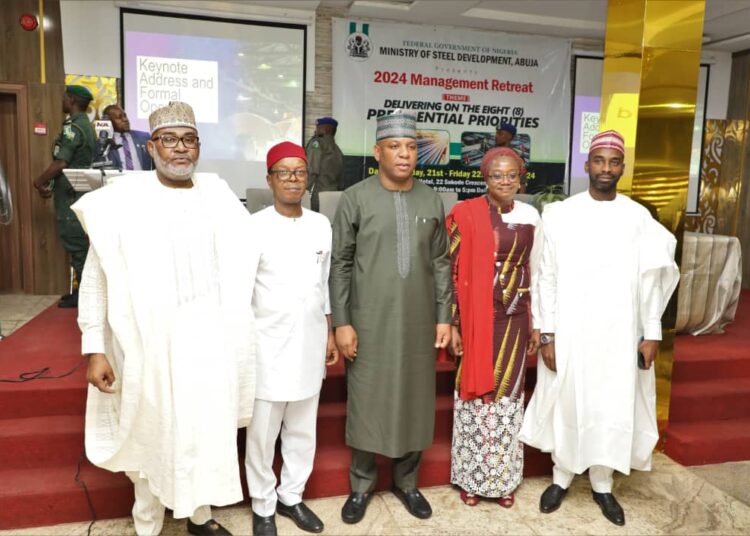The minister of steel development, Prince Shuaibu Abubakar Audu, has called for a special funding mechanism to drive the necessary policies and programmes to revitalise the comatose steel ministry and set the country on the path to industrialisation.
Prince Audu said that waiting for the customary budget releases, some of which come several months down the line, was a cog in the wheel of steel sector development.
He, therefore, advocated a Steel Sector Development Fund, akin to Solid Minerals Development Fund (SMDF) which caters to the Ministry Of Solid Minerals Development, to help the ministry move at a faster pace in revamping the steel sector.
The minister, who said this Thursday while delivering his keynote address at the opening of a two-day Ministerial Management Retreat organised by the Ministry to chart a course for achieving its Presidential Priorities, in Abuja, assured Nigerians of Ministry’s commitment to deliver on President Bola Ahmed Tinubu’s key priority of growing the Gross Domestic Product (GDP) of the country for sustainable economic and infrastructural greatness through the steel sector.
According to him, the reviewed Presidential 8-Key Priorities has the Steel Sector as focal point for driving the economic development of the country.
“A critical evaluation of the 8-Point Agenda suggests the critical place of the steel sector in the realisation of these goals, especially in the areas of industrialisation, manufacturing and unlocking the natural resources potentials of the country,” he said.
Speaking further, Prince Audu, while giving an overview of the steel industry from conceptualisation in 1958, stated that despite the ugly history of Steel Development in Nigeria in the past four decades, the President Tinubu’s administration has shown willingness to address the protracted challenges facing the industry.
According to him, the creation of the Ministry of Steel will give direct focus to the sector for it to become the bedrock of industrialisation of the Nigeria economy.
In his remarks, the minister of state of the ministry, Uba Maigari Ahmadu, stated that the retreat will afford the management staff the opportunity to dissect each of the eight key priorities of the administration and explore ways to translate them into actionable strategies for the Ministry.
He noted that the retreat will offer the valuable opportunity to: Deeply understand how each of the eight priorities intersects with the steel industry; Develop a comprehensive Roadmap that will align to the Ministry’s strategies with the Eight Presidential Priority areas; Identify Key Performance Indicators (KPIs) to measure progress and ensure accountability; Formulate Actionable Plans with realistic timelines and resource allocation for each priority area; Foster collaboration between the Ministry, the National Assembly, and stakeholders across the industry, among others.
Delivering her welcome address, permanent secretary the Ministry of Steel Development/Ministry of Solid Minerals Development, Dr. Mary A Ogbe, stated that the theme of the retreat, “Delivering on the Eight Presidential Priorities,” aligns perfectly with the Ministry’s goal of ensuring the optimal utilisation of the country’s steel resources for the overall benefit of the nation and its citizens.
Also speaking at the event, the chairman, Senate Committee on Steel Development, Sen. Patrick Ndubueze, reiterated the importance of the Ministerial Management Retreat as it offers an avenue for stakeholders to brainstorm, propose as well as propound ways to move the sector forward and harness the benefits for economic development of the country.
He told the minister and his officials that beyond the fine speeches, the success of achieving the mandate depends on their personal conviction to shun personal lucre and do the hard and honest work necessary to make the sector work well for the nation.
Earlier, in his goodwill message, chairman, House Committee on Steel Development, Dr. Zainab Gimbal, represented by the deputy chairman, Hon. Yusuf Umar Datti, stated that the House Committee attaches great significance to the development of the steel sector, as it would provide about 500,000 direct and indirect jobs for Nigerians when optimally developed.





